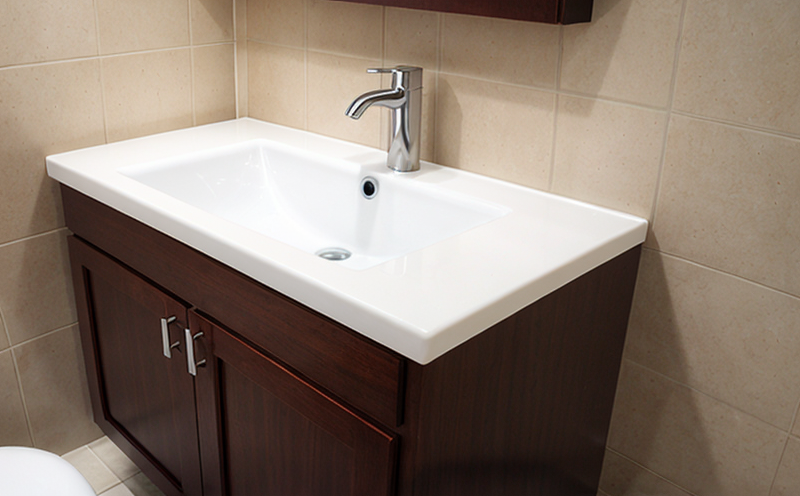DIN EN ISO 868 Hardness Testing of Bathroom Plastics
The DIN EN ISO 868 hardness test is a critical procedure used in quality assurance and regulatory compliance for bathroom plastics, such as those found in sanitary ware and plumbing fixtures. This test measures the resistance to indentation of plastic materials under specified conditions, which helps ensure consistent performance and durability.
Bathroom plastics are exposed to various environmental stressors including water, chemicals, temperature fluctuations, and mechanical loads. The hardness testing ensures that these materials can withstand such stresses without compromising their integrity or functionality. This is particularly important for products like shower trays, toilet seats, bidets, and other fixtures where long-term performance is essential.
The test involves applying a specified force to the surface of the plastic sample using a defined indenter (usually a spherical ball) at a specific rate until it penetrates the material. The depth of penetration, measured in millimeters, determines the hardness value. This method ensures that materials are suitable for their intended applications and meet international standards.
The DIN EN ISO 868 hardness test is widely recognized across Europe and beyond due to its strict adherence to international quality assurance protocols. Compliance with this standard enhances product reputation and marketability, ensuring consumer satisfaction and safety.
Incorporating the DIN EN ISO 868 hardness testing into a comprehensive quality control program helps manufacturers identify potential issues early in the development process. This proactive approach not only improves product reliability but also reduces costly rework and recalls. By focusing on this test, companies can ensure that their bathroom plastics meet stringent performance requirements and are suitable for long-term use.
For R&D engineers, this test provides valuable insights into material properties and potential improvements. Understanding how different plastic formulations perform under various conditions is crucial for innovation in the bathroom fixtures industry. Additionally, compliance with DIN EN ISO 868 helps procurement teams select suppliers who adhere to high-quality standards.
Companies that adopt DIN EN ISO 868 hardness testing as part of their quality management systems can demonstrate a commitment to excellence and reliability. This is particularly important for companies operating in competitive markets where brand reputation and product longevity are key factors influencing customer choice.
| Aspect | Description |
|---|---|
| Test Specimen | The test specimen should be a representative sample of the plastic material to be tested. It must have dimensions and geometry suitable for accurate hardness measurement. |
| Force Application Rate | The rate at which force is applied to the indenter should comply with the specified standards, typically ranging from 100 to 500 grams per second. |
| Indentation Depth | The depth of penetration by the indenter must be measured accurately using calibrated instruments. This measurement determines the hardness value. |
| Test Conditions | The test should be conducted under controlled environmental conditions, including temperature and humidity, to ensure consistent results. |
Scope and Methodology
- Determine the hardness of bathroom plastics using a defined indenter.
- Apply force at a specified rate until penetration occurs.
- Maintain test conditions for consistent results.
- Measure indentation depth accurately to determine hardness value.
Quality and Reliability Assurance
To ensure the reliability of hardness testing, several quality control measures are in place. These include:
- Calibration of test instruments to international standards.
- Regular maintenance and calibration checks for equipment.
- Training staff on proper specimen preparation and testing techniques.
- Use of standardized test specimens to ensure uniformity in results.
International Acceptance and Recognition
The DIN EN ISO 868 hardness test is highly regarded internationally, particularly within the European Union. Its acceptance ensures that manufacturers meet stringent quality requirements, which enhances market credibility.
Compliance with this standard can open doors to international markets where regulatory compliance is essential for product entry. It also allows companies to participate in global trade agreements and certifications.
By adhering to DIN EN ISO 868 hardness testing protocols, manufacturers demonstrate their commitment to quality and reliability, which is crucial for maintaining a positive brand image and fostering customer trust.





